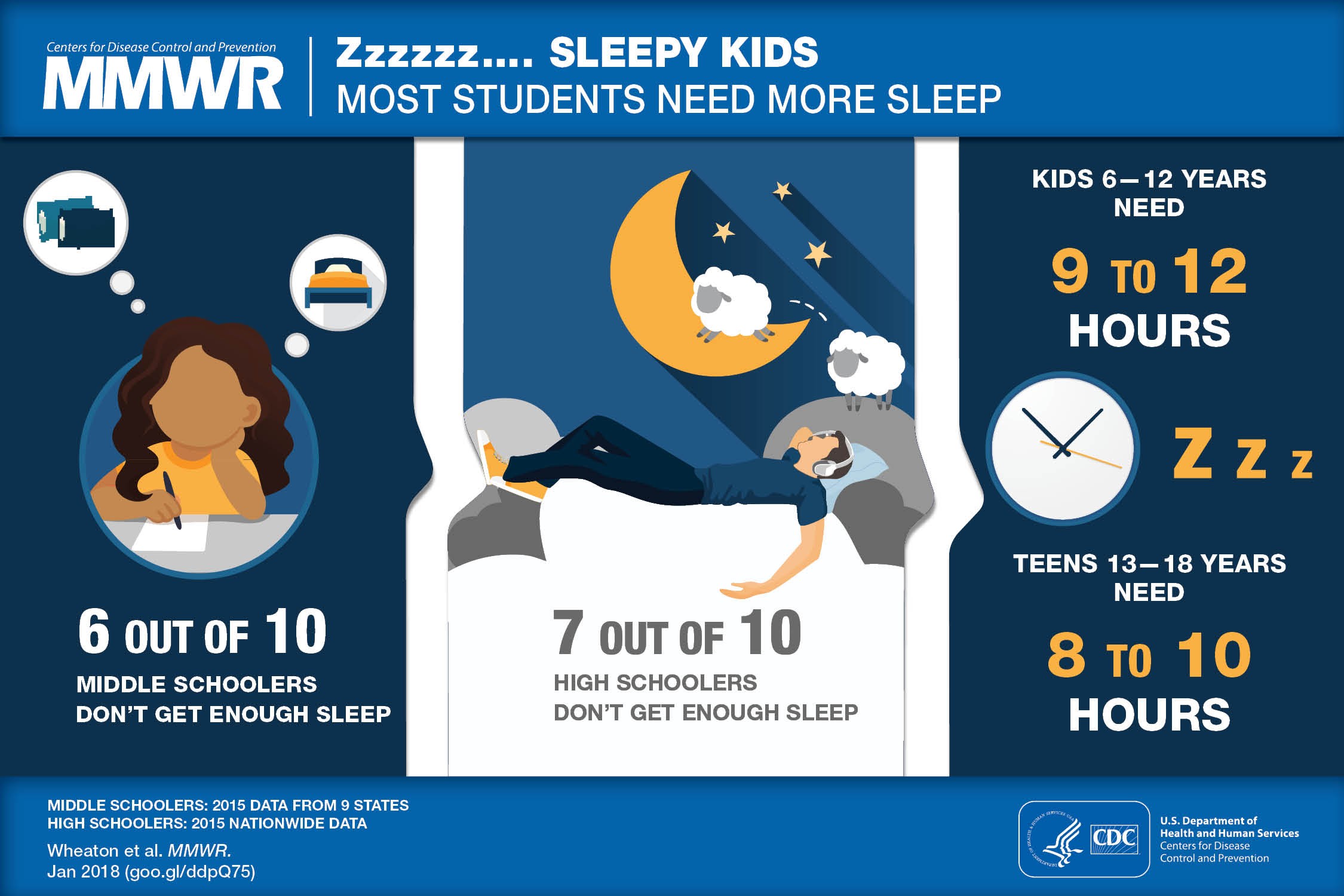For Success, Let Kids Rest

This fall, let’s set high-schoolers up for success by encouraging sleep
Going back to school wasn’t supposed to be this way.
 Guest Comment
Guest CommentLisa L. Lewis
Last spring, as vaccines against COVID-19 rolled out, we hoped the virus would no longer be a major factor in getting our kids back in the classroom.
While the past year and a half has shown how much is out of our hands, student sleep is one variable that is in our control — and it’s a straightforward way to help our state’s teens.
Masks may be a holdover from 2020, but the later secondary-school start times many districts have put in place represent a jump-start on California’s new healthy school start times law, which goes into effect July 1, 2022.
Does your school’s start time need to change?
That law — the first of its kind in the country — represents a major milestone in curbing rampant teen sleep deprivation and boosting teen health and well-being. It sets 8 a.m. as the earliest start time for the state’s public middle schools and 8:30 a.m. for high schools (including charter schools), with exemptions allowed for rural districts. San Diego, the second-largest district in the state, has already shifted to later starts, and there are others too, including San Jose, Manteca and Carlsbad.
In many cases, schools pushed back their start times during remote schooling, an all-too-rare silver lining of the pandemic. Teens benefited from both later classes and a non-existent commute, allowing for more sleep. That didn’t make up for the isolation and loss of peer interaction, but it did at least help counter their sleep loss.
Unfortunately, we don’t yet know when our teens will truly return to normalcy in the classroom, free of the threat of COVID variants and the various testing, masking and social distancing measures on campus to help keep them safe.
There is one thing we can do to help them boost their emotional resilience during this time, though, and that’s helping ensure they’re well-rested.
Teens need 8-10 hours of sleep per night
For starters, recognize that teens need 8-10 hours of sleep per night.
Of course, you can do the calculations on your own, but this bedtime calculator by the American Academy of Sleep Medicine may be an eye-opener. Adults can get by on as little as seven hours of sleep and still be in the recommended range, but that’s not the case for teens, whose body clocks won’t allow them to drift off until about 11 p.m. (This timing shift is tied to puberty.)
When schools start too early in the morning, it becomes close to impossible for teens to hit even the low end of the 8-10-hour range.
Pre-pandemic, only 22 percent of high-schoolers were getting at least eight hours’ of sleep, and many were getting far less than that, dragging down their health and well-being, academic performance and more.

What’s so bad about being sleep-deprived?
Chronic lack of sleep can make teens moodier and harder to live with. But the consequences are more far-reaching than that. Sleepy teens are more likely to be absent or tardy, they’re less likely to graduate, and they perform worse on tests than their well-rested counterparts. They’re more likely to be involved in drowsy driving crashes. And teen athletes who don’t get enough sleep are more likely to get injured.
There are serious mental-health implications too. Teens’ lack of sleep is linked to increased suicidality and higher rates of depression and anxiety.
That’s incredibly worrisome. Even before the pandemic, teens were struggling: In 2019, close to 20 percent of high-schoolers reported that they’d seriously considered suicide, and close to 37 percent said they’d felt sad or hopeless almost every day for at least two weeks.
We’re all still struggling with what it means to have lived through the events of the past year and a half, but some studies have already found that teens’ mental health issues worsened as a result.
Sleep boosts resiliency
Against this backdrop, the emotional resiliency that comes from being well-rested is more important than ever.
There are implications for physical well-being too, such as decreased susceptibility to catching a cold. Perhaps even more timely, given the latest news about COVID-19 vaccine boosters, being well-rested has been shown to boost antibody responses to vaccines.
How to build in more sleep this school year
Even for teens who don’t (yet) attend schools with healthy start times, there are steps you can take to help keep them from sliding back into an over-scheduled and under-slept existence.
Is their workload too great? If teens are overloaded with honors classes, sports and other activities, it may be time to re-evaluate and pare down.
Are they relying on caffeine or naps to get through the day? Used judiciously, these can be effective ways to help (but not eliminate!) daytime drowsiness. They can backfire, though. Too much caffeine and/or ingesting it too late in the day may make it harder to fall asleep at night. The same is true for naps that are too late or too long.
Are teens using tech until the wee hours? This can be complicated, as many teens rely on technology when doing homework and submitting assignments. Encourage them not to wait until the last minute to study or turn in their work. And be aware that social media and other tech use (such as video games) can easily cut into sleep time too. The official recommendations from the American Academy of Pediatrics call for teens to power down their devices an hour before bedtime. They should also turn off notifications on their phones. (Even better: have all family members — including teens — remove their phones from their bedrooms at night!)
You’ll also find sleep-hygiene tips and teen-friendly interactive activities at Let’s Sleep CA.
When California’s healthy school start times law goes into effect next July, teens around the state will benefit. But let’s not wait until then to promote sleep-friendly practices at home for our teens — or ourselves.
 Lisa L. Lewis is the author of Let’s Talk About Teen Sleep: Why Our Teenagers Are Sleep-Deprived, and How Parents and Schools Can Help Them Thrive (forthcoming June 14, 2022). More info is here. She worked extensively on California’s new law requiring healthy school start times for middle and high schools. Her work has been published in The New York Times, The Washington Post, The Atlantic, Slate, and elsewhere.
Lisa L. Lewis is the author of Let’s Talk About Teen Sleep: Why Our Teenagers Are Sleep-Deprived, and How Parents and Schools Can Help Them Thrive (forthcoming June 14, 2022). More info is here. She worked extensively on California’s new law requiring healthy school start times for middle and high schools. Her work has been published in The New York Times, The Washington Post, The Atlantic, Slate, and elsewhere.Tags on this post
Health SleepAll Tags
A-G requirements Absences Accountability Accreditation Achievement gap Administrators After school Algebra API Arts Assessment At-risk students Attendance Beacon links Bilingual education Bonds Brain Brown Act Budgets Bullying Burbank Business Career Carol Dweck Categorical funds Catholic schools Certification CHAMP Change Character Education Chart Charter schools Civics Class size CMOs Collective bargaining College Common core Community schools Contest Continuous Improvement Cost of education Counselors Creativity Crossword CSBA CTA Dashboard Data Dialogue District boundaries Districts Diversity Drawing DREAM Act Dyslexia EACH Early childhood Economic growth EdPrezi EdSource EdTech Education foundations Effort Election English learners Equity ESSA Ethnic studies Ethnic studies Evaluation rubric Expanded Learning Facilities Fake News Federal Federal policy Funding Gifted Graduation rates Grit Health Help Wanted History Home schools Homeless students Homework Hours of opportunity Humanities Independence Day Indignation Infrastructure Initiatives International Jargon Khan Academy Kindergarten LCAP LCFF Leaderboard Leadership Learning Litigation Lobbyists Local control Local funding Local governance Lottery Magnet schools Map Math Media Mental Health Mindfulness Mindset Myth Myths NAEP National comparisons NCLB Nutrition Pandemic Parcel taxes Parent Engagement Parent Leader Guide Parents peanut butter Pedagogy Pensions personalized Philanthropy PISA Planning Policy Politics population Poverty Preschool Prezi Private schools Prize Project-based learning Prop 13 Prop 98 Property taxes PTA Purpose of education puzzle Quality Race Rating Schools Reading Recruiting teachers Reform Religious education Religious schools Research Retaining teachers Rigor School board School choice School Climate School Closures Science Serrano vs Priest Sex Ed Site Map Sleep Social-emotional learning Song Special ed Spending SPSA Standards Strike STRS Student motivation Student voice Success Suicide Summer Superintendent Suspensions Talent Taxes Teacher pay Teacher shortage Teachers Technology Technology in education Template Test scores Tests Time in school Time on task Trump Undocumented Unions Universal education Vaccination Values Vaping Video Volunteering Volunteers Vote Vouchers Winners Year in ReviewSharing is caring!
Password Reset
Search all lesson and blog content here.
Login with Email
We will send your Login Link to your email
address. Click on the link and you will be
logged into Ed100. No more passwords to
remember!














Questions & Comments
To comment or reply, please sign in .